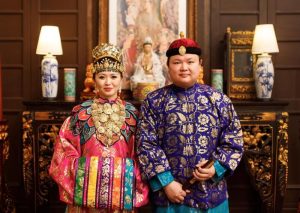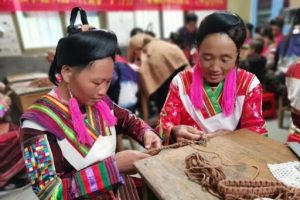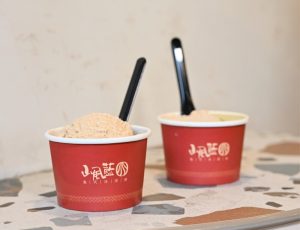
Use 比 (bǐ) or do not use 比 (bǐ)? That is one of the burning questions that often baffles Mandarin Chinese language learners as they grapple with the many nuances of making comparisons. Whether deciding between the use of 比 (bǐ), 没有 (méiyǒu), or other comparative structures, learners frequently find themselves unsure of which to use and when. However, in actuality, making comparisons in Chinese is more straightforward than one might initially think. So, fear not! I am here to introduce key structures and examples that will simplify the process, helping you to learn how to express comparative ideas with more confidence and relative ease.
COMPARISONS WITH 比 (Bǐ)
Imagine a scorching hot summer day. You want to go out, but it is too hot, so you decide to wait until tomorrow. The next day arrives, and you try to go out, but you realise it is hotter than yesterday! This is a perfect scenario that calls for the use of 比 (bǐ). Using 比 (bǐ) is one of the main ways to express a simple comparison in Chinese. This is used when you want to express that one thing is comparatively greater than another. It applies to anything, whether it be a time period, a person, a TV, a clothing item, anything can be compared using this structure. One easy way of learning the structure is to breakdown the concept into a simple formula (yes, we’re going to do a bit of grammar math in Chinese!):
Subject A + 比 + Subject B + Adjective =
Comparison (one subject is greater than the other)
Subjects A and B are the two things being compared, while the adjective represents the quality under comparison. For example, we can compare the price of two shirts, with the adjective being “expensive” or “cheap”; the blue shirt is more expensive than the red one. Similarly, we can compare the length of a skirt with the adjectives “long” or “short”; the pink skirt is shorter than the purple one.
Let’s revisit our initial summer day scenario and apply the grammar formula. In this case, we are comparing two different time periods: yesterday (昨天 zuótiān) and today (今天 jīntiān). The aspect under comparison is the temperature, more specifically, how hot it is. In Chinese, we can use the adjective 热 (rè), meaning “hot.”
How do we determine which subject occupies the Subject A and Subject B positions? It is actually quite simple! The greater element, in this case the hotter day, takes the Subject A position. Since “today” is hotter, “today” will occupy the Subject A position. So far, we have the following:
- Subject A: today (今天 jīntiān)
- Subject B: yesterday (昨天 zuótiān)
- Adjective: hot (热 rè)
Now that we have all the elements of the grammar formula, we are ready to assemble them to make our comparison. Let’s try!
今天比昨天热。
Jīntiān bǐ zuótiān rè.
Today is hotter than yesterday.
Good job! Now, let’s look at other ways to enhance this structure and make further comparisons.
USING 比较 (BǏJIÀO) TO MAKE COMPARISONS
Another way to compare is by using the adverb, 比较 (bǐjiào). This is used to express that something is “relatively” or “somewhat” in comparison to another, emphasizing a moderate or subjective degree of comparison. It is typically followed by an adjective. The grammatical structure is as follows:
Subject + 比较 + Adjective = Comparison (subjective in nature)
Example:
今天比较热。
Jīntiān bǐjiào rè.
Today is rather hot.
Here, we are making a comment on today’s weather. The speaker may be thinking that today is hot when compared to other days.
比较 (bǐjiào) can also be paired with a few verbs that indicate a speaker’s preference, or feeling such as 喜欢 (xǐhuan) “to like”, 爱 (ài) “to love”, 讨厌 (tǎoyàn) “to hate/dislike something” and 害怕 (hàipà) “to fear”. In this context, it conveys a somewhat subtle comparison, indicating a slight preference or aversion toward something over another.
Subject + 比较 + Verb = Comparison (subjective in nature)
Examples:
- 我比较爱看科幻书。
Wǒ bǐjiào ài kàn kēhuàn shū.
I rather like reading sci-fi novels/ I prefer reading sci-fi novels (in comparison to other types of novels)
- 我弟弟比较害怕黑暗。
Wǒ dìdi bǐjiào hàipà hēi’àn.
My younger brother is somewhat afraid of the dark. (My younger brother is afraid of the dark, but maybe he has more intense fears when compared to fear of the dark)
- 我比较讨厌吃咸的东西。
Wǒ bǐjiào tǎoyàn chī xián de dōngxi.
I rather dislike eating salty food. (I have an aversion to salty food compared to others.)
USING 更 (GÈNG) TO MAKE ENHANCE COMPARATIVE STRUCTURES
The adverb 更 (gèng) can be used with the comparative structure 比 (bǐ) to intensify the comparison. It adds the meaning of “even more” to the adjective, highlighting a greater degree of difference between the two subjects. With this in mind, let us adjust the structure a bit:
Subject A + 比 + Subject B + 更 + Adjective =
Comparison (one subject is greater than the other by a significant degree)
Example:
今天比昨天更热。
Jīntiān bǐ zuotian gèng rè.
Today is even hotter than yesterday.
In this sentence, 更 (gèng) intensifies the comparison. It shows that today’s temperature is not just hotter than yesterday’s temperature, but even hotter, by a greater degree.
Let us move away from the weather a bit and situate this comparative structure in a different context. Imagine two students, Shane and Melissa, in the same Spanish language class. Both are excellent students, but Shane’s language skills are superior to Melissa’s. As the greater component, Shane’s language skill will occupy the Subject A position, and Melissa’s is Subject B. Our adjective can be fluent (流利liúlì). Using the formula, we can make our comparison by arranging all the necessary components to state the following:
Shane的西班牙语水平 比 Melissa的西班牙语水平更流利。
Shane de xībānyáyǔ shuǐpíng bǐ Melissa de xībānyáyǔ shuǐpíng gèng liúlì.
Shane’s Spanish is much more fluent than Melissa’s.
When used with 比 (bǐ), it shows that Shane’s Spanish proficiency is not just slightly better, but significantly more fluent than Melissa’s. In other words, 更 (gèng) places emphasis to the degree of difference, suggesting that Shane’s Spanish is even more fluent than Melissa’s in a noticeable way.
See? Any context that requires a comparison, where one element is greater than the other, can be effectively expressed with the 比 (bǐ) sentence structure and can be also enhanced with the adverb 更 (gèng).
USING 没有TO MAKE COMPARISONS
When making a sentence with 比 (bǐ), we usually put the greater of the two items before the 比 (bǐ) character in the grammar formula. However, with 没有 (méiyǒu), you do the reverse. Imagine you and a friend are trying to select a movie to watch while hanging out. You happen upon two movies, “Dune” 《沙丘Shāqiū》 and “Inside Out” 《头脑特工队 Tóunǎo tègōngduì》. However, you prefer “Inside Out” and would like to make a comment about Dune not being as interesting as your choice. This is a scenario where you can use 没有 (méiyǒu). Here is the grammar formula:
Subject A + 没有 + Subject B + (那么 nàme) + Adjective =
Comparison (one subject is not as great as the other)
Here, the subjects are the two movies, but which one occupies the Subject A position? For comparisons with 没有 (méiyǒu), you put the “lesser” of the two in that initial position, with the “greater” one in the Subject B position. Our adjective here can be 好看 (“hǎokàn”, literally “good to look at”). The word “那么 (nàme)” or “so” can be used to enhance the adjective, but it is optional. So, our sentence will look something like this:
《沙丘》没有 《头脑特工队》那么好看。
“Shāqiū” méiyǒu “Tóunǎo tègōngduì” nàme hǎokàn.
Dune is not as entertaining as Inside Out.
Got it? Let’s try in another context.
You have two siblings, both are tall, but your younger brother just happens to be a little taller than your older brother. As such, you want to express that your older brother is not as tall as your younger brother.
我哥哥没有我弟弟高。
Wǒ gēge méiyǒu wǒ dìdi gāo.
My older brother is not as tall as my younger brother.
USING 最 TO MAKE COMPARISONS
What’s your favourite dessert? A tough question, right? For me, it is ice cream! In Chinese, I would say, 我最喜欢冰淇淋 (Wǒ zuì xǐhuan bīngqílín). The character 最 (zuì), meaning “the most,” is a superlative used to indicate the highest degree. It allows you to make an indirect comparison, emphasizing one singular option that stands out when compared to others. In my example, ice cream stands out as the best dessert among all others. The corresponding grammar formula is as follows:
Subject + 最 + Adjective/Verb =
Comparison (one thing is the best out of all possible options)
Example:
- 我最爱吃香蕉。
Wǒ zuì ài chī xiāngjiāo.
I love bananas the most (It is the best in my opinion when compared to other fruits)
- 她是我们班里最聪明的学生。
Tā shì wǒmen bānlǐ zuì cōngmíng de xuésheng.
She’s the smartest student in the class. (She is the smartest when compared to the other students in the class)
Summary
Making comparisons in Mandarin Chinese may seem daunting at first, but understanding the key structures makes the process much simpler. Here’s a recap of what was discussed in the article:
Structure #1
Your go-to structure for direct comparisons is by using 比 (bǐ) since it explicitly states that one thing is greater than another.
Subject A + 比 + Subject B + Adjective
Structure #2
To further enhance the comparison with 比 (bǐ), you can use the adverb 更 to enhance the degree of the quality being compared.
Subject A + 比 + Subject B + 更 + Adjective
Structure #3
When making more moderate or subjective comparisons, you can use the adverb 比较 (bǐjiào). It works with both adjectives and verbs.
Subject + 比较 + Adjective/Verb
Structure #4
For comparisons where one thing is less than another, you can use the comparative structure with 没有 (méiyǒu).
Subject A + 没有 + Subject B + (那么) + Adjective
Structure #5
When you want to present an absolute preference or express the idea of “most” or “best,” use 最 (zuì).
Formula: Subject + 最 + Adjective/Verb
Now you have all the tools to make comparisons in Mandarin Chinese, whether you want to talk about preferences, people, or even the weather. To make practicing comparative sentences more relatable, try using familiar subjects like family members. This helpful guide to family members in Chinese is a great place to start (The Complicated Chinese Family Tree | The Chairman’s Bao). You could even compare your favourite shows in Chinese! Check out this article Netflix Shows to Learn Chinese in 2022 | The Chairman’s Bao for inspiration.
Now, go ahead and start experimenting with these structures! 加油!Jiāyóu!
FAQ
- What is the difference between 没有 (méiyǒu) and 比 (bǐ) in comparisons?
没有 (méiyǒu) is used to show that something “is not as [adjective]” as another, while 比 (bǐ) explicitly states the difference between the two things. For example, “你没有我忙” (Nǐ méiyǒu wǒ máng) means “You are not as busy as I am,” whereas “你比我忙” (Nǐ bǐ wǒ máng) means “You are busier than I am.”
- Can 比 (bǐ) and 更 (gèng) be used together in a sentence?
Yes, 比 (bǐ) and 更 (gèng) can be used together for added emphasis or to make the comparison stronger. For example, “她比我更努力” (tā bǐ wǒ gèng nǔlì – She is even more hardworking than me).
- Can 比 (bǐ) and 比较 (bǐjiào) be used together in a sentence?
Yes, 比 (bǐ) and 比较 (bǐjiào) can also be used together even though they serve different functions. 比 (bǐ) focuses on the comparison between two things, while 比较 (bǐjiào) conveys a sense of “relatively”. For example, “今天比昨天比较冷” (jīntiān bǐ zuótiān bǐjiào lěng) means “Today is relatively colder than yesterday,” combining comparison with relativity.
Author Bio:

Janine R. Lutchman is a foreign language educator and published author from Cocorite, Trinidad and Tobago. She holds a Bachelor of Arts (First Class Honours) in Latin American Studies with minors in Spanish and Brazilian Studies from The University of the West Indies, a Postgraduate Diploma in the History of the Portuguese Empire from Universidade Nova de Lisboa, and a Master of Science in Educational Leadership, Management, and Emerging Technologies from MIU City University Miami. Her journey with Chinese began as an extracurricular activity during her undergraduate studies. Enchanted by the language, she immersed herself in its study, eventually becoming a passionate Chinese language educator. She has taught Chinese language and culture to learners of all ages and levels, inspiring many through her engaging teaching methods. Janine’s short stories in Chinese appear in the Easy-to-Read Chinese graded reader series, and her work has earned international recognition, including a feature in CCTV’s “Written in the Sky: My Stories with China” series.























